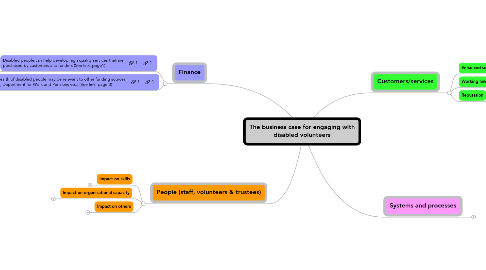
1. Finance
1.1. Disabled people can help develop high quality services that are purchased by customers and funders (See link: page1)
1.2. Demonstrating improved health of disabled people may be relevant to other funding sources [e.g. Department of Health, Department for Work and Pensions etc.] (See link: page 3)
2. People (staff, volunteers & trustees)
2.1. Impact on skills
2.1.1. Inclusive recruitment practices, increases the skills available to the organisation (See link: page 5)
2.1.2. Disabled people may be better problem-solvers (See link: page 6)
2.1.3. Disabled people may be better planners (See link: page 4)
2.2. Impact on organisational capacity
2.2.1. Disabled volunteers can enhance the organisation's ability to identify needs of alienated and neglected members of the community (See link: page 7)
2.2.2. Disabled volunteers may be among the most productive and most committed of volunteers (See link: page 7)
2.2.3. Disabled staff have better records than non-disabled staff for performance, attendance, job-stability and safety (See link: page 7)
2.2.3.1. Also, see link: page 5)
2.2.4. Disabled staff can be more loyal and have fewer sick days that non-disabled staff (See link: page 6)
2.2.5. Organisations enhance their people resources by employing disabled volunteers who have proven their skills through volunteering (See link: page 7)
2.2.6. People with a learning disability are an untapped resource of dedicated volunteers (See link: page 3)
2.2.7. Involving disabled volunteers exposes the organisation to a wider range of experiences and ideas (See link: page 6)
2.3. Impact on others
2.3.1. Enhanced job satisfaction for staff gained from the knowledge that disabled volunteers are benefiting from their involvement (See link: page 14)
2.3.1.1. (Also, see link: page 5)
2.3.2. Working in a person-centred way [no 'one-size fits all'] could enhance volunteering experience for other volunteers (See link: page 4)
2.3.3. Development of a culture where staff and volunteers are happier to consider they need help with something (See link: page 6)
3. Customers/services
3.1. Enhanced services
3.1.1. Involving disabled volunteers exposes the organisation to a wider range of experiences and ideas, making them more innovative and creative (See link: page 6)
3.1.2. Services can be improved by disabled volunteers, who see things from a different perspective (See link: page 5)
3.1.3. Disabled volunteers can bring mutual support to clients they work with who have similar impairments (See link: page 5)
3.1.4. Disabled volunteers might be more sensitive to the needs of alienated and neglected members of the community (See link: page 7)
3.1.5. Involving disabled volunteers helps to keep the work of the organisation relevant to the wider community (See link: page 5)
3.1.6. Disabled volunteers can make a tangible contribution to project outcomes and the organisation's services (See link: page 7)
3.2. Working links
3.2.1. Engaging with disabled volunteers develops stronger links with other voluntary/community organisations (See link: page 9)
3.2.2. The benefits for disabled volunteers may be relevant to other stakeholders (See link: page 7)
3.3. Reputation
3.3.1. Involving disabled people can help to present a more welcoming face to the public (See link: page 5)
3.3.2. Organisations can demonstrate their Corporate Social Responsibility to engage with disabled people (See link: pages 2-3)
3.3.3. Providing opportunities for older disabled volunteers increases and strengthens community support for the organisation (See link: page 3)
3.3.4. Projects that effectively engage with disabled volunteers can act as an inspiration for others (See link: page 11)
3.3.5. Ability to profile the organisation as one that represents the community (See link: page 7)
